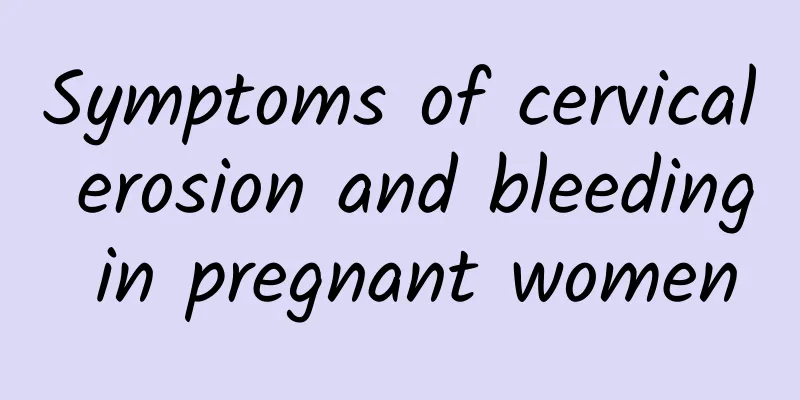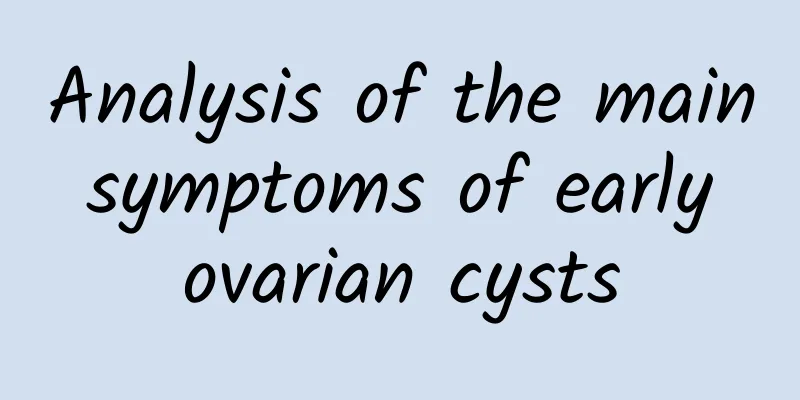Symptoms of cervical erosion and bleeding in pregnant women

|
Symptoms of cervical erosion and bleeding in pregnant women: Bleeding during pregnancy is not necessarily a sign of threatened abortion. After pregnancy, as the months of pregnancy progress, the levels of estrogen and progesterone in the pregnant woman's body continue to increase, causing the cervical columnar epithelium to move outward, tissue hyperplasia, and cervical erosion symptoms to significantly increase, making it easy to bleed. Excessive sexual activity, eating chocolate, chili peppers, longan and other caloric, irritating foods, and hot pot can also aggravate bleeding symptoms, bleeding and spontaneous abortion. Uterine contraction causes the placenta and uterus to separate and bleed, which does not directly affect fetal development. As long as the bleeding is stopped in time, it can still progress normally, but if not treated in time, it will affect pregnancy and may eventually lead to abortion. There are two types of cervical erosion. One is caused by inflammation, also called true erosion, which requires anti-inflammatory treatment. The other is a common physiological change in women of childbearing age under the action of estrogen in the body. In women of childbearing age, due to the influence of hormone levels in the body, the cervical column epithelium proliferates and moves. Because the column epithelium is very thin, the capillaries and red stroma are exposed, and there is a clear boundary with the surrounding squamous epithelium, which looks like erosion, but it is not actually a disease. It is now called cervical column epithelial displacement. Because the epithelium of the cervical canal is thin and has relatively weak resistance, it is easily invaded by various pathogens, leading to inflammation, and then abnormalities such as increased vaginal discharge and leucorrhea odor occur. In addition to paying attention to vaginal hygiene, you should also pay attention to vaginal secretion inspection after pregnancy. Once infection is found, you should take medication under the guidance of a doctor to effectively prevent complications such as miscarriage. Never refuse treatment for fear that the medication will affect the fetus in the womb. |
<<: What tests should women with habitual miscarriage do?
>>: What are the symptoms of mucinous ovarian cysts? Can they cause infertility?
Recommend
What are the clinical manifestations of irregular menstruation?
Irregular menstruation is a common gynecological ...
What are the common early symptoms of cervical erosion?
I don't know if you know about cervical erosi...
The hazards of acute cervicitis are mainly the following
Acute cervicitis is a type of cervicitis. There a...
Auspicious days for abortion - When is the best time to have an abortion
Many people think that abortion means going to th...
What are the precautions for recurrent miscarriage? Pay attention to these 3 points
Women with recurrent miscarriage should pay atten...
Some patients may experience bleeding after vaginal medication. What is the reason?
Vaginal bleeding after medication may be caused b...
You can practice while sitting! 4 minutes of Tabata slimming and fat burning exercise every day, quickly slim down your arms and eliminate arm fat
The fat in the area where the arms connect to the...
What causes endometriosis to recur?
Endometriosis not only threatens women's phys...
What are the laboratory auxiliary examination items for diagnosing ectopic pregnancy?
Before miscarriage or rupture and bleeding occurs...
I have had pelvic inflammatory disease for two years and have lower abdominal pain every once in a while. What should I do?
I have had pelvic inflammatory disease for two ye...
How to calculate the cost of artificial abortion
Artificial abortion is a term used to terminate p...
Losing so much weight that I am anemic and have no energy! Drinking the right blood-replenishing chicken soup will help you lose fat more effectively!
I have lost so much weight that I am anemic and l...
Do uterine fibroids affect pregnancy?
Do uterine fibroids affect pregnancy? Uterine fib...
Several causes of irregular menstruation
Menstrual irregularities are common in adolescent...
What are the symptoms of pelvic inflammatory disease? Treatment depends on the condition
Pelvic inflammatory disease is a common disease a...









